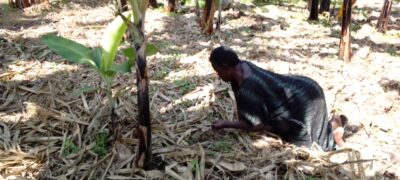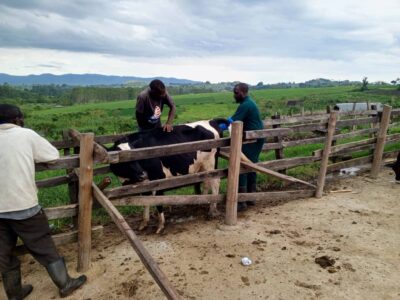Voice of Toro’s green leaf magazine, a catalyst in transforming farmers from subsistence to commercial farming
 coffee Subject matter specialist Sunday Simon and Kabarole district production officer Dr. Salvatore Abigaba in one of the green leaf episodes at Voice of Toro
coffee Subject matter specialist Sunday Simon and Kabarole district production officer Dr. Salvatore Abigaba in one of the green leaf episodes at Voice of Toro
By Musa Polite
Farmers in Toro and Rwenzori have taken up farming as a business after Voice of Toro’s farm radio supported farmers’ program commonly known as green leaf magazine proved effective on guiding many farmers on better farming practices.
The program tackles different value chains through episodes developed by a team of broadcasters and subject matter specialists, doing value chains ranging from banana, dairy, coffee among others provide different technical guidance on how to start such value chain projects, maintaining them, good practices and how best they can be improved to enable a farmer earn from such ventures.
A once a week program done every Sunday 4-5pm and repeated on Thursdays 11 – 12pm has episodes including farming news, weather forecast, market prices, gender inclusion in farming, topical discussion and many others has proved to be effective after farmers have come out to testify how they have been helped to improve in their respective fields.
Basaija Moses, LCI chairperson Garweya zone in Buhesi sub county Bunyangabu district says he used to rear between two to five goats because of lack of knowledge on feeding, but after several episode of the green leaf magazine, he learnt how to prepare and preserve silage, he now does goat rearing as a business as he has increased the number of goats to over 50 now.
According to him, even in the dry season his breeds are healthy because he preserves food for them through silage. He now buys goats, look after them and sell to earn profits.
David Arituha, a dairy farmer from Nombe sub county in Ntoroko district says before initiation of the green leaf magazine, he used to milk from plastic buckets and selling in jerry cans, sometimes his milk could easily get contaminated but after several episodes of better milking practices at Voice Of Toro, he resorted to milking in piles and selling in metallic cans, he has now regained the money that would otherwise be lost through poor handling practices.
Arituha also asserts that through the green leaf magazine, he has learnt that there are agriculture extension officers at the sub county and he used the extension officer to get proper dehelmintization drugs which has improved on the quality of the animals.
According to him, he has learnt better spraying practices like using crash and spraying all over the animal body parts until they all get wet, he no longer suffer pests and diseases because he sprays in time and in recommended practices
Miss Sarah Kakaire Manzi, a female in her early sixty’s hails in Rwentuha, Kyaka Kyegegwa district with over fifty herds of cattle says her milk production has gone high, she attributes it to the disease prevention dairy episode at Voice of Toro where she says that after several episodes on disease control, she learnt how to control diseases, found alternative routes to the people that were crossing their animals through her farm.
According to her, though she has over fifty cattle, she never used to do artificial insemination for better breeds but after the breeds and breeding episodes of the green leaf magazine, she has now invited an extension worker from the her sub county for guidance.
”Am optimistic that the cows that are yet to be inseminated will give me better breeds. i have really gained much from that program. By the way… my cows used to have rough skin, not knowing that its a sign of unhealthy cow . that program has changed my mindset. I have started treating them and am seeing a significant change.” miss Kakaire observed.
Kakaire’s farm in Rwentuha Kyegegwa district, she says trespassers used to bring diseases in her farm
The banana value chain episodes of the green leaf magazine also helped Miss Beatrice Balinda to reduce weed in her banana plantation after several episodes of weed control.
Miss Balinda asserts that she used to get around fifteen ananas of poor quality from her two and a half acres of banana planation because managing such big plantation single handedly was not easy hence the planation was being affected by weeds but after weed control episodes of the banana value chain, she started mulching and now, the quality and quantity of the bananas has drastically improved to over fifty each week.

Balinda weeding in her banana plantation, she says mulching has reduced the weed 95%
According to Miss Balinda, mulching has also helped on water retention in the plantation because the banana plants keep healthy because of the moist soils kept well by mulching. She can now maintain her family and pay school fees for the school going children and grandchildren.
Kiconco Kaijuka, a 57year old female from Ruteete sub county in Kabarole district operates a three acre coffee plantation.
According to Kiconco, her yields were very few like eight dried sacks each season because her plantation was bare, with weeds but after several episodes of the green leaf magazine at Voice of Toro, she learnt weed control measures like timely weeding and mulching and since then, the plantation is now flourishing, has now changed from the yellowish leaves it previously had to now green and healthy leaves, her plantation is now mulched and its nice looking.
”Though I haven’t harvested ever since I started weed control measures, I can foretell that the yields are going to be high because a coffee plant that used to give me like one raw basin of coffee seeds has now multiplied like a hundred times’’ Kaijuka said
Rebeca Kaijuka, at her coffee plantation in Ruteete sub county Kabarole district
The program has also seen an improvement in the eyes of subject matter specialists as Alinda Benedict, the assistant animal husbandry officer in charge of Kicwamba Sub County in Kabarole district explains.
According to Mr. Alinda, since initiation of the green leaf magazine, specifically the dairy value chain, Kicwamba Sub County At Large has seen an improvement and increase in the number of people forming parish development model (PDM) dairy enterprises, an indication that many people have taken up dairy farming as a business.
”The number of people demanding artificial insemination all over the sub county has increased and by the way pasture preservation has improved because of that radio program.” Alinda was quoted saying
 Alinda Benedict, assistant animal husbandry officer Kicwamba Sub County inseminating a cow in Kaguma village.
Alinda Benedict, assistant animal husbandry officer Kicwamba Sub County inseminating a cow in Kaguma village.
Alinda also says calf death has drastically gone down. ‘‘Before initiation of green leaf magazine, about eight out of ten calves would have challenges after birth and many would die but now, the number of people complaining about calf death has reduced to not less than three out of ten.’’ Alinda noted
Ben Also observes that the number of people seeking extension services has increased. According to him, it would take at least four to six months for a farmer to come for extension services and guidance at the Sub County but now, at least three to four people come to the sub county to seek for extension services weekly.
End


